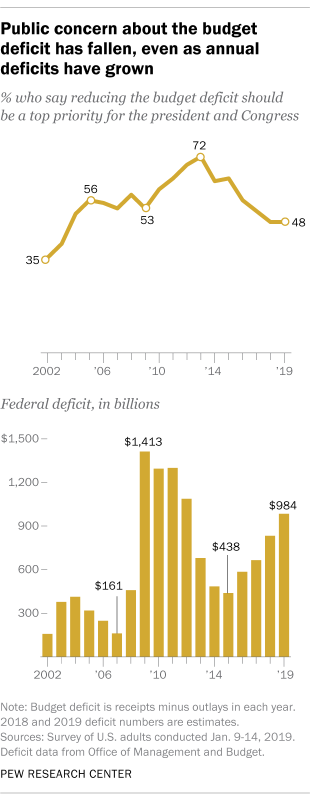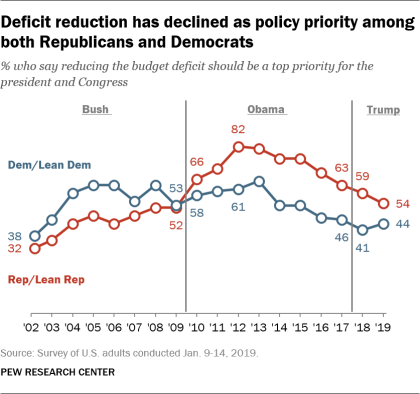 The nation’s growing budget deficit has prompted little alarm among the U.S. public. In fact, the share of Americans who say reducing the budget deficit should be a top policy priority is much lower than it was during most of Barack Obama’s presidency.
The nation’s growing budget deficit has prompted little alarm among the U.S. public. In fact, the share of Americans who say reducing the budget deficit should be a top policy priority is much lower than it was during most of Barack Obama’s presidency.
In a Pew Research Center survey conducted in January, about half of Americans (48%) said reducing the budget deficit should be a top policy priority this year for the president and Congress. That was unchanged from 2018, but 24 percentage points lower than in 2013, at the start of Obama’s second term.
In this year’s survey, deficit reduction ranked well behind strengthening the economy (70% said this was a top priority), reducing health care costs (69%), improving the educational system (68%) and several other policy priorities.
The Office of Management and Budget projects the federal government will run a deficit of $984 billion in the current fiscal year. That would be the highest in seven years and more than double the deficit in fiscal 2015 ($438 billion).
Annual budget deficits surpassed $1 trillion from 2009 through 2012, and the share of Americans viewing deficit reduction as a top policy priority surged during this period. As annual deficits declined, so did concern about the deficit. But the rise in deficits more recently has not been accompanied by an increase in public concern.
 Since 2013, deficit reduction has fallen as a top priority among both Republicans and Democrats. Today, 54% of Republicans and Republican-leaning independents and 44% of Democrats and Democratic leaners say reducing the deficit should be a top priority for President Donald Trump and Congress.
Since 2013, deficit reduction has fallen as a top priority among both Republicans and Democrats. Today, 54% of Republicans and Republican-leaning independents and 44% of Democrats and Democratic leaners say reducing the deficit should be a top priority for President Donald Trump and Congress.
Six years ago, about eight-in-ten Republicans (81%) said reducing the deficit should be a top priority and about two-thirds of Democrats (65%) agreed.



